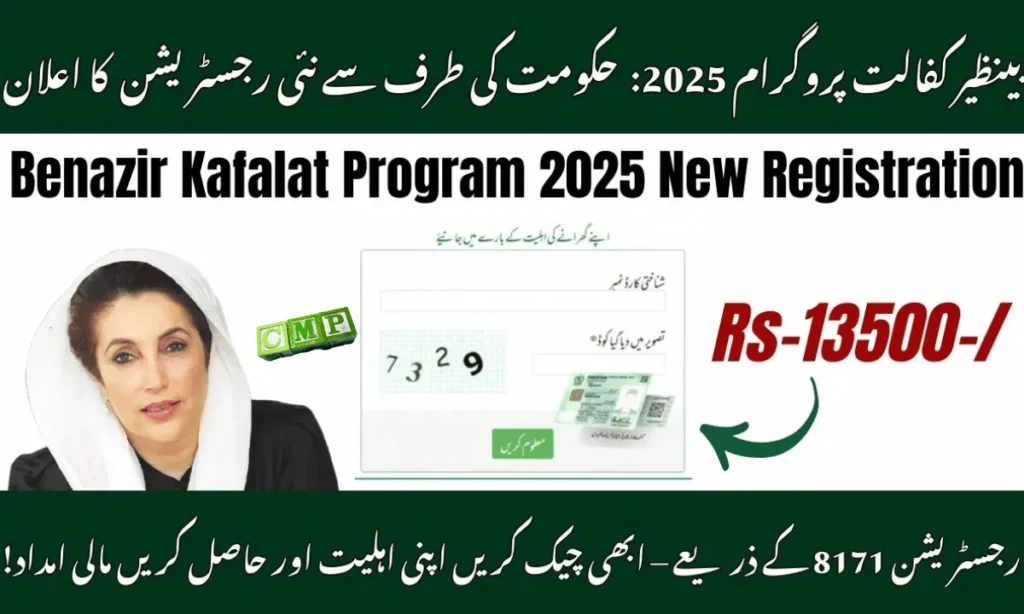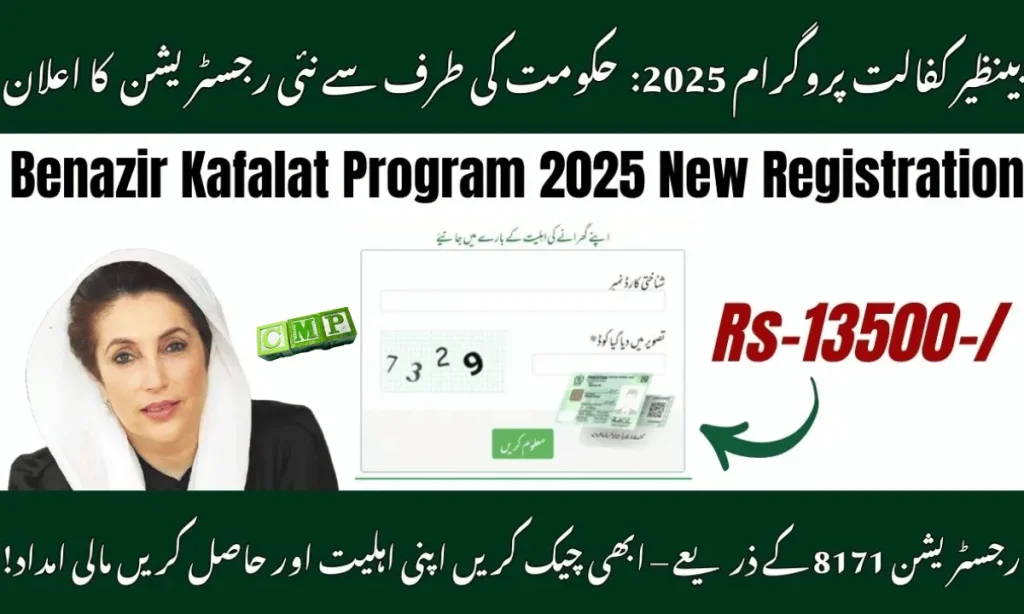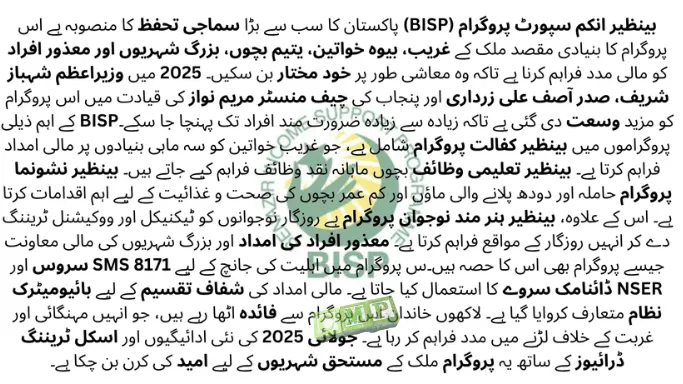The Benazir Kafalat Program 2025 New Registration Through 8171 is a golden opportunity for millions of low-income women across Pakistan. The Government of Pakistan has officially announced in Budget 2025 that the number of eligible women under BISP will increase to 1 crore (10 million). With this expansion, more families will receive quarterly financial aid to manage household expenses, educate their children, and afford healthcare needs.
The purpose of the Benazir Kafalat Program is to provide regular cash assistance to deserving women, reduce poverty, and promote financial independence. In times of inflation, unemployment, and rising living costs, this program ensures that no poor household is left behind. Whether you live in a rural village, remote area, or urban city, the 8171 BISP system makes it easier than ever to check eligibility and register.
Through the 8171 SMS service and the 8171 Web Portal, every woman can instantly verify whether she qualifies. If you are a female head of household with a valid CNIC and your family income is low, you can complete your Dynamic Survey at a nearby BISP office and start receiving payments. These payments are released quarterly through HBL Konnect, partner banks, and BISP payment centers.
This article provides complete details about eligibility, required documents, registration process, and the benefits of the Benazir Kafalat Program 2025.
Key Highlights of Benazir Kafalat Program 2025
| Feature | Details |
|---|---|
| Budget Year | 2025 |
| New Target | 1 crore (10 million) eligible women |
| Support Type | Quarterly cash payments under BISP |
| Coverage | Nationwide – all provinces included |
| Policy Status | Approved in Budget 2025 |
| Eligibility | Low-income women with valid CNIC (verified via NSER/8171) |
| Registration Methods | SMS to 8171 or 8171 Web Portal |
| Current Payment | Rs. 13,500 per quarter |
| Payment Channels | HBL Konnect, BISP centers, and partner banks |
| Main Goals | Low-income women with a valid CNIC (verified via NSER/8171) |
What Is the Benazir Kafalat Program 2025?
The Benazir Kafalat Program is the flagship financial aid scheme under the Benazir Income Support Programme (BISP). It provides quarterly cash transfers to poor women, especially those who are heads of households.
Main Goals of the Program:
- Support female-headed households
- Reduce extreme poverty in Pakistan
- Empower women with financial independence
- Help families afford food, education, and healthcare
Currently, the program provides Rs. 13,500 per quarter, and with the 2025 expansion, more women than ever will benefit.
Why Is 8171 Registration Important?
The 8171 registration is the official and mandatory way to join the Benazir Kafalat Program 2025. Without completing the Dynamic Survey or checking CNIC details through 8171, beneficiaries cannot receive payments.
Registration verifies households based on:
- CNIC validity
- Income level and poverty score
- Employment and pension status
- Household details from the NSER survey
With the new 2025 expansion, where the target is increased to 1 crore women, the registration process has been simplified for women in rural and underserved areas.
Required Documents for Benazir Kafalat Program 2025 Registration
To register under the Benazir Kafalat Program 2025 New Registration Through 8171, carry the following documents when visiting a BISP office or completing your survey:
- Valid CNIC (must be original and active)
- Children’s B-Form (for Taleemi Wazaif beneficiaries)
- Household information (family size, income, expenses)
- Latest electricity or gas bill (proof of residence)
- Mobile number registered on CNIC
- Widow Certificate / Husband’s Death Certificate (if applicable)
- Disability Certificate (if applicable)
These documents help verify your eligibility, identity, and household status.
How to Register Through 8171?
The government has made the process simple with three registration methods:
Method 1: Registration Through 8171 SMS Service
- Open the SMS option on your phone
- Type your 13-digit CNIC number without spaces
- Send it to 8171
- Wait for an official BISP reply
The reply will show:
- Eligible – You qualify and can complete the Dynamic Survey
- Not Eligible – You do not meet criteria (e.g., higher income, govt job)
- Further Verification Required – Visit the nearest BISP office
Important: Always use a SIM registered on your CNIC.
Method 2: Registration Through 8171 Web Portal
- Visit the official 8171 Web Portal
- Enter your CNIC number
- Type the captcha code shown on screen
- Click Submit to view eligibility instantly
If eligible, you will be guided to complete your Dynamic Survey at a BISP office.
Method 3: Registration at Nearest BISP Office
For women without mobile or internet access:
- Visit your nearest BISP Tehsil Office
- Carry original CNIC and required documents
- Request for Dynamic Survey registration
- Provide complete household information
This method is especially helpful for rural families.
Step 4: Receiving Payments
After successful registration, beneficiaries receive Rs. 13,500 quarterly via:
- BISP Payment Centers
- HBL Konnect outlets
- Partner banks and ATMs
A confirmation SMS from 8171 will notify beneficiaries whenever new payments are released.
Eligibility Criteria for Benazir Kafalat Program 2025
The table below clearly explains who qualifies and who does not:
| Eligible Women | Ineligible Women |
|---|---|
| Female head of household | Government employees & pension holders |
| Valid and active CNIC | Fake or expired CNIC |
| Belonging to low-income family (NSER verified) | Families with high income or business ownership |
| Widows & divorced women without financial support | Women already receiving govt financial aid |
| Belonging to a low-income family (NSER verified) | Families owning land, property, or assets |
| Women verified through Dynamic Survey | Families paying high utility bills |
| Residents of rural and urban poor communities | Families living below the poverty line |
Benefits of Benazir Kafalat Program 2025
- Quarterly cash support of Rs. 13,500
- Assistance for poor families to manage daily expenses
- Better nutrition for women and children
- Support for school-going children through Taleemi Wazaif
- Relief against rising inflation and cost of living
- Empowerment of women through financial independence
- Special support for widows and divorced women
- Poverty reduction in rural and urban areas
- Access to healthcare for mothers and children
- Emergency financial aid during economic crises
- Transparency via CNIC and 8171 Dynamic Survey
- Nationwide coverage in all provinces
- Payments through HBL Konnect, BISP centers, and ATMs
- Improved social equality and reduced child labor
Conclusion
The Benazir Kafalat Program 2025 is a lifeline for millions of low-income families in Pakistan. With the 8171 New Registration process, women can easily check their eligibility, register, and start receiving support.
By providing quarterly cash assistance, educational stipends, and digital verification through CNIC and NSER, this program not only reduces poverty but also strengthens women’s role in household financial management.
If you are eligible, complete your 8171 registration today to secure consistent financial support and a brighter future for your family.
FAQs – Benazir Kafalat Program 2025
Q1: How can I register for the Benazir Kafalat Program 2025 through 8171?
Send your CNIC number via SMS to 8171. After NSER survey verification, you will receive confirmation of eligibility.
Q2: What is the role of the NSER survey?
The NSER survey collects household data to verify families below the poverty line. Only those verified are included in BISP.
Q3: Who is eligible for the program?
Low-income women, widows, and divorced women with verified NSER data and a valid CNIC are eligible.
Q4: Who is not eligible?
Government employees, pension holders, and families with high income, land, or assets are not eligible.
Q5: How much financial assistance is given?
Each eligible woman receives Rs. 13,500 quarterly.
Q6: Can I apply online?
Yes, through the 8171 Web Portal using CNIC and captcha verification.
Q7: What is the poverty score requirement?
Families with poverty scores below 32 are generally considered eligible.


